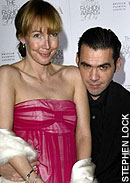**so here is the story!!!...
telegraph.co.uk...
'I can't regret anything'
(Filed: 28/10/2005)
Roland Mouret stunned the fashion world by quitting his own label. He talks exclusively to Sarah Mower
*
As Roland Mouret has had plenty of time to reflect while he looked at this week's newspapers, fashion is not all glamour and riches, even in a week when a roll-call of Hollywood's most desirable young actresses, from Rachel Weisz to Scarlett Johansson to Cameron Diaz to Kiera Knightley have been photographed everywhere wearing the new "It" dress.
Far from it: yesterday, Mouret was on a London bus, on his way to the doctor, suffering from stress and effectively out of a job after resigning from the company that bears his name.
*
"It's overwhelming," he says. "The sad thing is to think of all the support I have had from the British press. But I can't regret anything."
Even among fashion insiders, the news of the departure of Mouret from Roland Mouret Design counts as one of the most unexpected and fast-moving stories for a very long time. For once, this is not the drearily familiar tale of a poorly run, inefficiently financed British fashion company going belly-up.
On the contrary, Mouret appeared to have risen above the routine fate of the "young British designer" by having at least as much business substance as style. With extraordinary timing, his hourglass "Galaxy" dress was this week celebrated with acres of photographs in magazines and newspapers as the celebrity-endorsed dress of the moment.
After five years, Roland Mouret Design was about to make a profit, had taken over £1 million in orders on its spring collection and was impressing all-important store buyers in America, where it has built up 38 per cent of its business. Just for once, this seemed to be shaping up as one business that could at last prove an independent British fashion company could operate on the world stage in an inspiringly grown-up way.
The resonance of Mouret's design had hit almost perfect pitch, according to Suzanne Tide-Frater, creative director at Harrods, who witnessed an "absolutely unbelievable" reaction to a customer preview of his spring collection. Making a personal appearance in the store, Mouret sold 20 dresses in an hour and a half. "He's developed a style and a handwriting, and an incredible mix of women can wear his clothes," she says. "What grieves me specifically is that he was one British designer - French, OK, but from London - who had an internationally relevant signature that's now, that's commercial, and he has humility with it."
Perhaps too much humility. The problem was that Roland Mouret did not own, or even part-own, the company. Since he signed up with the Scottish businesswoman Sharai Meyers and her banker husband, André, in 2000, Mouret has been an employee, designing out of the company's studio off the King's Road in Chelsea. Though Meyers has stated that Mouret was due a share issue when the company broke profit (which was apparently expected at the end of the financial year next April), a terminal disagreement, the nature of which neither party has yet explained, blew up.
Since then, fashion gossip has focused on the confounding intransigence of a situation in which both sides apparently stand to lose. Roland Mouret is still placed as an "emerging" name rather than a brand with a separate, stand-alone value of its own (something that takes a fashion company around 30 years - like Armani, Chanel, Calvin Klein - to achieve, if it's exceptionally lucky).
So why would the Meyers let Mouret go when the company was only just becoming viable, after five years of relentless investment? And five years back, why did Mouret, at the age of 39, sign away his name in the first place?
Until yesterday, both parties seemed determined to remain elegantly discreet over these issues, but then a further flashpoint erupted. When Mouret read that Sharai Meyers had described him as "part of a team", while floating the possibility that the company is considering continuing, in some form, by utilising the talents of the backroom staff, he determined to have his say.
"I've been represented as part of a designing team," he says, "but I have to make that straight: I was the only designer. If there's something I'm proud of, it's my technique. I do not sketch on paper or think in 2D, I drape on the body, and I evolved that in the studio with technical people, who then made the patterns. Yes, they own the patterns. They can make re-editions. But I do not believe that when women are spending £800-£1,000 on a dress, that they want to buy a copy - of the past."
To understand why Mouret signed away his name one has to retrace his career to 1998, to a show in Bermondsey, in which he showed a collection at a point when, he frankly admits, "I fastened fabric with safety pins, because I didn't know how to do a buttonhole."
Penniless, he nevertheless had an idea - informed by his native French chic - about wrapping the body in a length of fabric, which proved sexily irresistible to all women who saw it. "It was like in the movies, when you would see a couple in bed after making love, and there would be the woman, with just a sheet wrapped around her."
Sharai Meyers, who had just sold her management consultancy business, asked Mouret to make her a dress. She wore it to a polo match, and her husband proposed to her on the spot. Energetic, intellectually sharp, socially connected and skinny enough to qualify as a muse, Sharai proposed backing Mouret. André Meyers would become chairman.
More than just partners in a business arrangement, Sharai and Mouret genuinely seemed to have hit it off in a way that looked like a template for good practice. But why did Mouret agree to unequal terms?
"Because I wanted to exist. You know the story of Faust? You will trust anyone if you want something so much. But I must say that everything did exist beautifully between us, until the last year." He dismisses any speculation that his departure has been prompted by any new job offer. "That is wrong. I did not plan this."
On the upside, as Mouret fully acknowledges, "I would not be here without Sharai." Her backing gave him the time to pursue and perfect the draping technique of which he is so proud. She took him to show his collections in New York, thus cracking the most significant of fashion markets, and, effectively, put his name on the radar of fashion talent-seekers, whether that means women who buy clothes or corporations looking for design posts to fill.
What of the future? "I'm Edith Piaf. Je ne regrette rien."
Though he is currently on sick leave, Mouret faces the prospect of working out his notice in Chelsea for six months. After that, he'll almost certainly find a slot in some house or another in Paris, Milan or America. More money and more prestige may still come his way - but as things stand, it will never be under his own name again.











